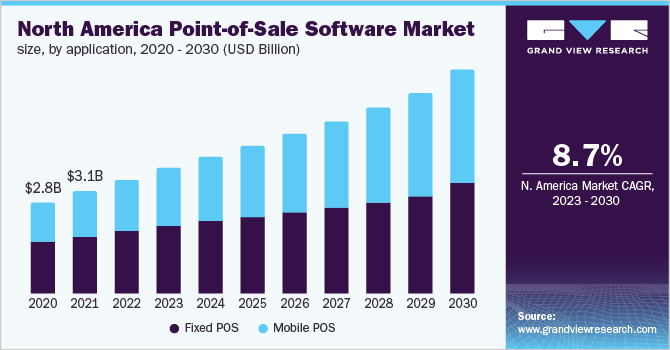Increasing customer expectations and fierce competition have compelled retailers to come up with innovative strategies that can boost their revenues. According to Statista, in 2023, global retail e-commerce sales reached an estimated 5.8 trillion U.S. dollars.
Projections suggest a 39 percent growth in this figure over the coming years, with expectations to surpass 8 trillion dollars by 2027.
One of the most significant advancements is the development of mobile applications for retailers. These apps offer a seamless shopping experience, personalized marketing, and efficient operational management.

Importance of Retail Apps in the Modern Market
Retail apps are not just a trend but a necessity in the modern market. They provide retailers with tools to enhance customer engagement, streamline operations, and ultimately increase revenue. Having a robust app can make all the difference in a competitive market.
Types and Categories of Retail Apps
1. E-commerce Apps:
E-commerce apps are designed to facilitate online shopping, allowing customers to browse products, make purchases, and track orders from their mobile devices.
2. Loyalty Program Apps:
Loyalty program apps incentivize repeat purchases by rewarding customers with points, discounts, and exclusive offers.
3. Inventory Management Apps:
Retail store inventory app helps retailers keep track of stock levels, manage orders, and reduce the risk of overstocking or stockouts.
4. Customer Relationship Management (CRM) Apps:
CRM apps enable retailers to manage customer data, track interactions, and personalize marketing efforts, improving customer satisfaction and retention.
5. Point of Sale (POS) Apps:
POS apps play a crucial role in streamlining the checkout process, managing inventory, and providing valuable sales analytics for modern retail operations. Research from Grand View Research indicates that the global point-of-sale software market size was valued at USD 11.99 billion in 2022.
It is estimated to register a compound annual growth rate (CAGR) of 10.8% from 2023 to 2030. This underscores the significance of POS apps in driving efficiency and innovation within the retail sector.

Image Source: Grand View Research
Features of Successful Retail Apps
- User-Friendly Interface: A successful retail app must have an intuitive and user-friendly interface to ensure a seamless shopping experience for customers.
- Secure Payment Options: Secure and diverse payment options are crucial for building customer trust and facilitating smooth transactions.
- Personalized Recommendations: Personalized recommendations based on customer behavior and preferences can significantly enhance the shopping experience and boost sales.
- Push Notifications: Push notifications keep customers informed about new products, promotions, and order updates, encouraging engagement and repeat purchases.
- In-App Customer Support: Providing in-app customer support through chat or call features ensures that customers can get help quickly and conveniently.
Tip: For a custom retail app Development that enhances customer engagement, boosts sales, and streamlines operations, consider partnering with App-Scoop. As a top app development company in Vancouver with a stellar 4.8-star rating on Clutch, we excel in building ‘Better’ Digital Products ‘Faster.’
Our expertise lies in creating top-notch digital solutions that stand out in user experience, quality, and innovation. Our proven methodology ensures a smooth development process, adding substantial business value and accelerating your path to achieving real, impactful results. Invest in an innovative smart retail app from App-Scoop to grow your retail business.

Benefits of Retail Apps
| 1. Enhanced Customer Engagement: | Retail apps offer various tools and features to engage customers effectively. Personalized recommendations, interactive content, and loyalty programs help maintain a strong connection with customers, encouraging ongoing interaction and interest. |
| 2. Improved Customer Loyalty: | By providing personalized experiences and rewards through loyalty programs, retail apps can significantly boost customer loyalty. Satisfied customers are more likely to return, increasing repeat business and lifetime value. |
| 3. Increased Sales and Revenue: | Retail apps make shopping convenient and personalized, driving higher sales. Features like secure payment options, personalized product suggestions, and seamless navigation enhance the shopping experience, leading to increased revenue. |
| 4. Efficient Operations: | Retail apps streamline several operational tasks, such as inventory management, sales tracking, and customer support. This efficiency reduces operational costs and allows retailers to focus on enhancing the customer experience. |
| 5. Data-Driven Insights: | Retail apps collect valuable data on customer behavior, preferences, and trends. Analyzing this data helps retailers make informed decisions about marketing strategies, product development, and overall business improvement. |

Challenges and Solutions for Apps
1. Development Costs:
Developing a high-quality retail app can be expensive. However, the long-term benefits, such as increased sales and customer loyalty, often justify the investment.
2. Security Concerns:
Ensuring the security of customer data is paramount. Implementing robust security measures and regularly updating the app can mitigate these concerns.
3. Integration with Existing Systems:
Integrating a retail app with existing systems can be challenging. Choosing a flexible and scalable app solution can ease this process.
4. User Adoption:
Encouraging customers to download and use the app can be difficult. Effective marketing strategies and providing valuable features can drive user adoption.

Retail apps are crucial for modern retailers, providing benefits like increased customer engagement, loyalty, sales, and operational efficiency. Features such as personalized recommendations, secure payments, and in-app support can significantly boost revenue.
Investing in a well-designed app helps retailers stay competitive and meet customer needs. Utilizing new technologies and regularly updating the app ensures sustained growth and success.
Frequently Asked Questions
How can mobile apps help retailers increase revenue?
Mobile apps provide retailers with the ability to directly engage with customers, offer personalized experiences, run promotions, and streamline shopping processes. They can also facilitate upselling, loyalty programs, and faster checkout, all of which contribute to higher sales.
Why are mobile apps important for customer retention in retail?
Mobile apps allow retailers to offer personalized content, loyalty rewards, and push notifications, which help keep customers engaged and encourage repeat purchases. This increases customer loyalty, which is key to long-term revenue growth.
How do mobile apps improve the shopping experience for customers?
Mobile apps enhance the shopping experience by offering features such as easy browsing, personalized recommendations, seamless checkout, and order tracking. These features improve convenience, leading to higher conversion rates and increased sales.
Can mobile apps help retailers gather valuable customer data?
Yes, mobile apps enable retailers to track user behavior, preferences, and purchase history. This data can be used to tailor marketing efforts, optimize product offerings, and improve customer service, leading to more targeted sales strategies.
How do mobile apps contribute to the success of loyalty programs?
Mobile apps make it easier to implement and manage loyalty programs, allowing retailers to reward customers for their purchases, track rewards, and send personalized offers. This boosts customer retention and incentivizes repeat purchases.
How can push notifications increase sales for retailers?
Push notifications allow retailers to send timely updates, special offers, or reminders to customers directly on their mobile devices. These notifications can drive customers back to the app, increasing the chances of additional purchases.
How do mobile apps help with inventory management for retailers?
Mobile apps can integrate with inventory management systems to provide real-time updates on stock levels. This helps retailers manage their inventory more efficiently, reduce stockouts or overstocking, and ensure popular products are always available to customers.
Can mobile apps support in-app purchases, and how does that increase revenue?
Yes, mobile apps can support in-app purchases, allowing customers to buy products or services directly from their devices. This reduces friction in the purchasing process, leading to higher conversion rates and increased revenue from both new and repeat customers.
How do mobile apps enable better customer service for retailers?
Mobile apps provide features such as live chat, customer feedback, order tracking, and self-service tools. These features improve customer satisfaction by addressing issues quickly, leading to higher customer retention and more frequent purchases.
What role do mobile apps play in expanding a retailer’s market reach?
Mobile apps allow retailers to reach a global audience, enabling them to expand beyond physical store locations. With features like geolocation, apps can also offer localized deals and services, allowing retailers to cater to diverse markets and increase sales.





